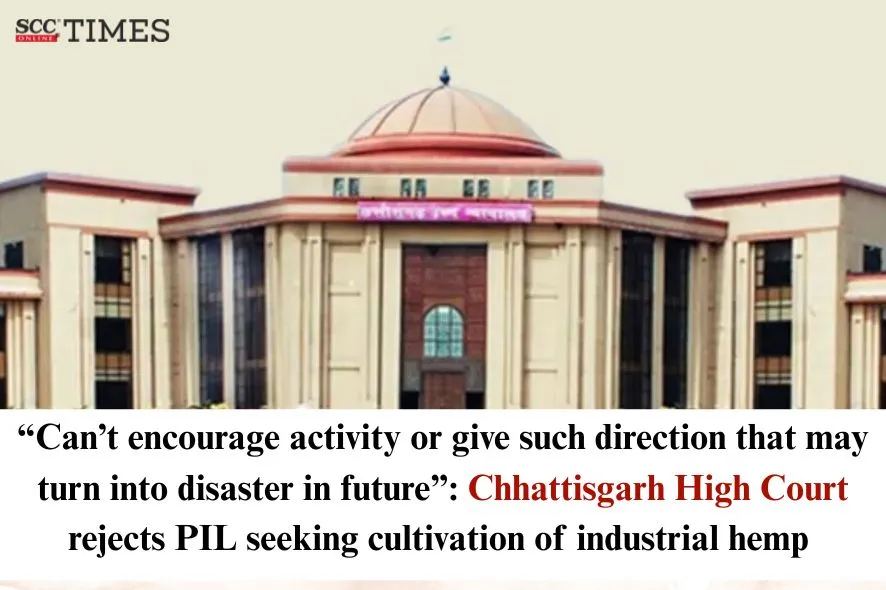Chhattisgarh High Court: In a public interest litigation (‘PIL’) seeking direction to the State for permission to grow, possess, and cultivate industrial hemp, the Division Bench of Ramesh Sinha*, CJ., and Bibhu Datta Guru, J., rejected the PIL, holding that not only were the reasons assigned by the petitioner to permit cultivation of cannabis frivolous and baseless, but the petitioner also had no locus standi and it was not a genuine PIL.
Background
The petitioner contended that hemp was a ‘golden plant’ which had many benefits and had the potential to benefit the farmers of Chhattisgarh immensely. He contended that according to the Narcotics and Psychotropic Substances Act, 1985, (‘NDPS Act’) mass cultivation of hemp for horticultural and industrial uses was permitted but, Sections 10 and 14 of the NDPS Act, which give the State Government the power to decide the limits within which licences may be issued for its cultivation, had never been used. Further, no regulations or rules had been made by the State to facilitate medical or industrial use of the plant.
The petitioner also contended that Uttarakhand had detailed guidelines on the cultivation of industrial hemp, whereas Himachal Pradesh had constituted a committee for investigation into the possibility of cultivating industrial hemp.
He further stated that he filed his representation to all authorities concerned, but was met with no response.
Analysis
At the outset, the Court reiterated that the Courts had a duty to ensure that there was no personal gain, private motive, or oblique motive behind the filing of PIL. The Courts should, prima facie, verify that the petitioner had bona fide credentials and ensure that the PIL is aimed at redressal of genuine public harm or public injury. Otherwise, the jurisdiction in public interest can become a source of misuse by private persons seeking to pursue their vested interests. In this regard, the Court referred to a catena of judicial precedents including, inter alia, Gurpal Singh v. State of Punjab, (2005) 5 SCC 136.
Regarding the present case, the Court stated that it was a matter of grave concern that the consumption of narcotic and psychotropic substances in Chhattisgarh had increased manifold in recent years, and it not only had evil effects on the body and mind of the consumer, but also ruined the entire family and society. The offences relating to contraband and psychotropic substances are on the rise in the State. The Court added that there were a number of instances wherein crimes were committed by an offender in a state of inebriation without understanding the consequences of their act.
“It not only lands the offender in incarceration, but also ruins the entire family, as when the sole bread earner is lodged in a jail, his family is the biggest sufferer.”
Under the garb of this PIL, the Court remarked that it could not encourage any such activity nor issue any direction to the State, which may turn out to be a disaster in the future.
Regarding the petitioner’s averments, the Court held that the reasons assigned by the petitioner to permit the cultivation of cannabis in Chhattisgarh were frivolous and baseless. Additionally, the Court stated that the petitioner had no locus standi and it was not a genuine PIL.
Furthermore, the Court stated that the petitioner approached the Court under the garb of public interest, seeking directions which fell squarely within the domain of legislative and executive policy of the State. The Courts cannot direct the Government to make policy decisions, particularly in sensitive areas like narcotic control. Additionally, the cultivation of hemp is prohibited under the NDPS Act, save for specific permitted purposes and through statutory procedure. Cannabis cultivation is generally prohibited except for medical, scientific, industrial, or horticultural purposes and only with government authorization. Given the aforesaid, the Court held that the petitioner neither demonstrated any public interest nor followed the appropriate legal mechanisms. Thus, the present petition could be termed a misuse of the judicial process.
Accordingly, the Court rejected the PIL, holding that it was not satisfied that it was a genuine petition filed in the public interest.
[Dr. Sachin Ashok Kale v. State of Chhattisgarh, 2025 SCC OnLine Chh 6927, decided on 07-07-2025]
*Order authored by: Chief Justice Ramesh Sinha
Advocates who appeared in this case:
For the petitioner: Petitioner in person
For the respondent: Sangharsh Pandey, Government Advocate


